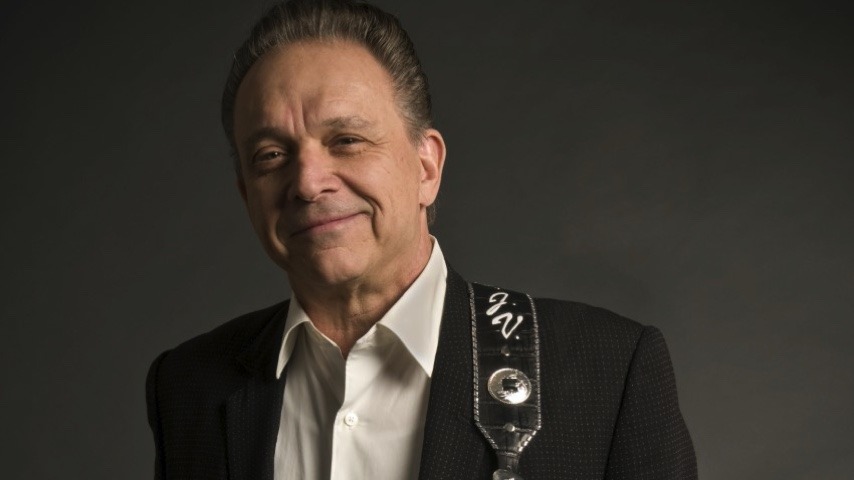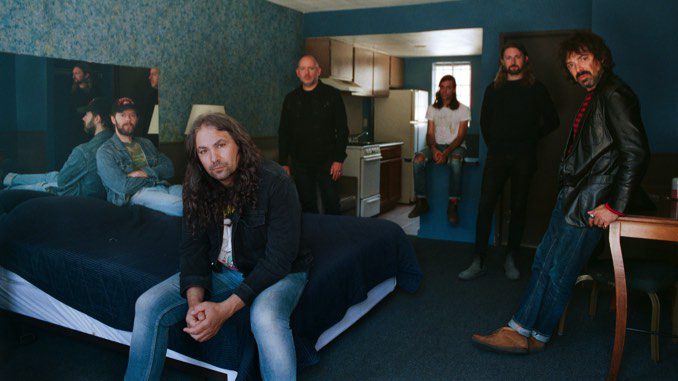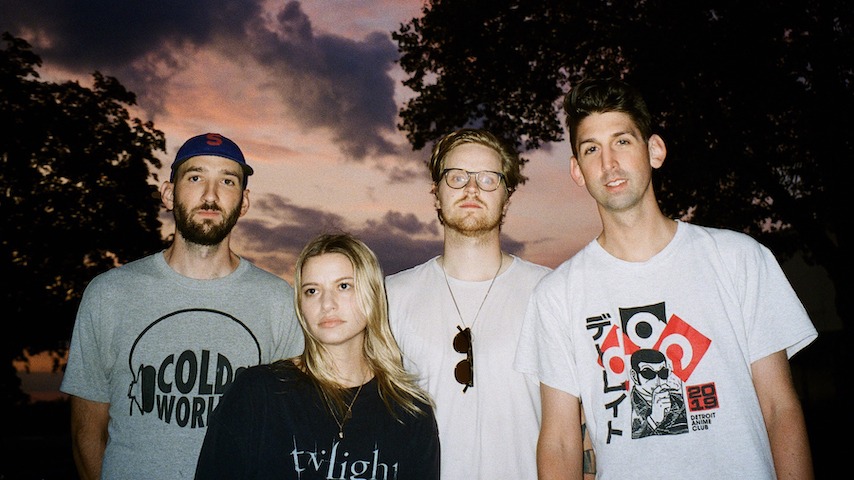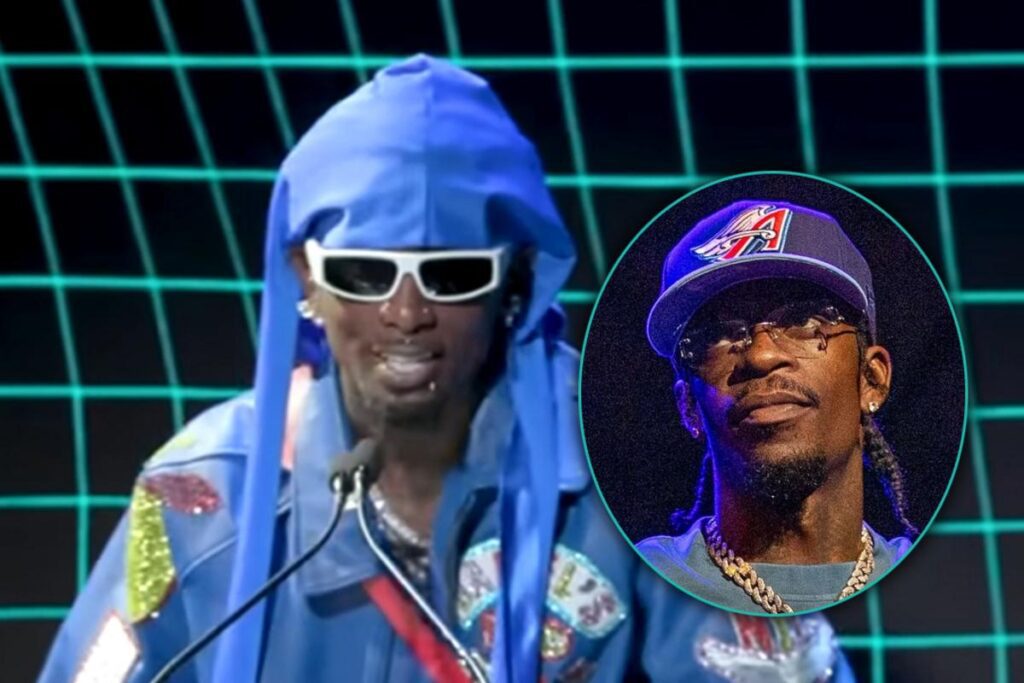The installation in Dallas’ Kiest Park is eye-popping—four 8’x10’ interlocking burnished-steel panels by artist Casto Solano, titled “We Are Music and Music is Us” and etched with the imagery and lyrics of Texas blues guitarist Jimmie Vaughan and his late kid brother Stevie Ray. The edifice was just erected near the Oak Cliff neighborhood where they both grew up, and was the brainchild of film director Kirby Warnock, whose indie documentary From Nowhere—The Story of the Vaughan Brothers is about to see worldwide release. There’s just one little hitch, admits the surviving sibling.
“They were going to have a big concert and gathering there to unveil it,” the Austin native says. “But because of COVID-19, we couldn’t do that, so we keep putting it off. So I myself haven’t even been there yet—I’ve only seen pictures.”
Plan B now is to finally dedicate “We Are Music” next March 20, when Vaughan turns 70 and will be releasing a comprehensive box set, with a companion book penned by music historian and fellow Texan Bill Bentley. And he understands that in our post-coronavirus era, all of the best-laid plans of mice and men are subject to change at a moment’s notice. Which is why Vaughan wanted to release his latest project—a 31-track anthology of his favorite R&B covers called The Pleasure’s All Mine, combining two previous tribute albums plus bonus tracks—now, to strike while the retrospective iron was hot. The four-time Grammy winner isn’t trying to think too deeply about his legacy, which dates back to his breakthrough band The Fabulous Thunderbirds in the mid-’70s. “Because obviously, when you do a career-spanning compilation, it must mean that you’re getting to the end of it,” he says, sighing somberly. “But the truth of it is, I just always loved to play music, and I still do.”
Paste: You find comfort where you can these days. I actually just stumbled across a cable station called FETV that plays nothing but retro shows, everything from The Addams Family to The Saint and the great Wild Wild West. The classics are always best—wouldn’t you agree?
Jimmy Vaughan: Yeah. For sure. But I sort of quit watching TV a few years ago. It’s not that we don’t have a television—I don’t mean that. But we just don’t watch the networks. We might watch a movie or an old show, but we don’t sit and watch TV. Instead, I listen to music. I have a record player—a turntable and an old stereo—and I have a lot of LPs. And then I have CD, too, and then there’s always YouTube. So there’s a lot of ways to find what music you’re looking for, whatever it might be.
Paste: What have you stumbled across on YouTube?
Vaughan: You’d be surprised. There’s a lot of old R&B, a lot of old country, a lot of stuff from the ’40s and ’50s. If you think of an artist that you used to enjoy, you can usually go and type their name in, and a lot of stuff will come up. And there are a lot of kids—and I call ‘em ‘kids’ because I’m gonna be 70—that I’ve found out there like Gary Clark Jr., who I think is really great. There are several young artists that I’ve found that are sort of retro, or they’re making the kind of music that I like, a lot of great musicians that are kids coming up. I can’t tell you all of their names, but the cycle just goes on and on, doesn’t it? But I just like music. And as soon as I started trying to play, in about ’62, I started to see a lot of great stuff come and go, and there still is. So I feel very fortunate to be able to do what I love. I feel like an artist who—if you have a blank piece of paper and some pens or a paint brush, you can just paint what you want and let your mind follow. And that’s what I actually do, if I had to explain it.
Paste: Do you really paint?
Vaughan: I draw. I draw pictures. I just use pen or pencil, and I kind of do little sketches. I’ve always drawn, since I was a little kid. But when I made Family Style, I went to Los Angeles, and I was in a studio out there. But at the hotel, they had what they called a Psychic Fair, and there were a lot of psychically gifted ladies sitting around in a room. So I kind of walked around and found one that I for some reason connected with, and I sat down and said, “I’m trying to write an album, but I’m kind of stuck.” And she said, “Well, if you can remember this, in the future if you get a pencil and a piece of paper and you start drawing, you will open yourself back up.” And I always remembered that. If you get stuck with your art or whatever it is that you enjoy, you can sit down and draw a picture, and it will open it back up. Like, say you’ve got a recording session, but you’ve got three or four songs missing—it works. But it’s always good to have a little pressure, too.
Paste: What do the drawings look like?
Vaughan: Well, it’s not really anything for anyone else to see or appreciate, it’s more just for me. And I think something about sketching just opens everything up. And I don’t have a subject, exactly. I draw shapes. So I guess that “shapes” is the best way you could explain it. I don’t even know what you would call it, and I don’t even know where all those drawings are now. But it’s more like a therapy session. I just start thinking, “I’m gonna go find a notebook and draw.” So if you’ve got something on the inside of you and you know it, and you’re just waiting for it to come out, one way to get there is to go and start drawing, and it will just open up. And time-wise? It’s never the same. And I’d actually forgotten all about it until you just mentioned it. So I tried it—now you try it!
Paste: My articles sort of write themselves in my head while the actual interview is taking place.
Vaughan: Well, that’s the way it is when you find a song that you like, or you write a good song. It’s the same feeling. But you know when you get that flash of recognition, of knowing what it is? That’s where you want to go when you’re writing songs. So a lot of times, it’s just that flash of knowing, but then it’s up to you to just follow through.
Paste: I once asked Guy Clark how—after every year that passes, and that many more hundreds, thousands of songs get set in copyright stone—you can actually write an original tune, and he sighed and said, “It’s the hardest job in the world.”
Vaughan: I can understand both ways. It’s not really hard to get an idea for a song, because that is more like a flash. But the difficult part is actually dealing with finishing it. But then you get the payoff when you can actually step back and say, “Yes. I like that.” Finding your own sound is part of it, too. I remember when I was a kid, and I was trying to learn how to play guitar, and I would always be fascinated by other artists. I would listen to B.B. King or Freddie King or Lonnie Mack or someone that I enjoyed, and I would think to myself, “How did they decide what to play on the solo?” Or, “What made them go for that tone?” So the next revelation that came to me was, I imagined that I was in the room with my favorite guitar players, and it was a round, and everybody played and then it got to me—what was I gonna do? Because I couldn’t do what they did—I could maybe borrow a bit from each guy, but I’d have to ultimately do my own thing. So if you start asking yourself, “What is it that I do?,” it will come. But you have to ask, right? It seems like you always have to back to the very beginning and just lay in the dirt and moan and groan to get started sometimes.
Paste: Hey! That’s exactly what I’ve been doing ever since this coronavirus hit!
Vaughan: Ha! Me too! But I’m here outside of Austin with my family, and I have my children and my grandchildren and a lovely wife, and we have a lot of animals. My wife has horses, and we have dogs and cats and some livestock So I’ve been able to think of it more as an extended vacation than some sort of jail sentence.
Paste: Well, you also have a good eye for classic aesthetics. The packaging on your 2018 album Baby, Please Come Home is Blue Note-retro, and the special colored vinyl version is Aztec Gold, like your signature guitar. You really like that Aztec Gold.
Vaughan: Yes. It’s a very nice color. And it’s very hard to pick out all this stuff, but I do respect an attention to detail. That’s what I love about hot rods and guitars, classic cars and art. And it’s just amazing to me that we get to be—or we choose to be—artists in life, when everybody else has to work. So I’ve got it good. I love what I do, but I always remember to do the actual groundwork to keep doing it.
Paste: How did you get into collecting vintage automobiles?
Vaughan: When I was a kid, a friend of mine said, “If you want to get girls, you’re gonna have to play football.” And I said, “Oh, my. Well…okay.” So I went to school and they had football tryouts, and the coach said, “Okay—I’m gonna call out your name, and you run out and we’ll throw you a pass and we’ll see how you do.” This is a true story, okay? And he yells, “Vaughan!,” and I run out there and they threw me a football, and I mysteriously caught it. But the next thing that happened was, all the other guys tackled me and piled on top of me, so I broke my collarbone and I had to stay home for three months because I was injured. And my dad said, “I don’t know what in the hell we’re gonna do with you, so here—just play your guitar and keep out of trouble.” And I’ve been playing guitar ever since.
But my first love was cars. And I used to live on a street that was down the street from an area that had a Dairy Queen and several other drive-ins on the strip, and that’s where all the kids went with their cars. So every night, they would drive down my street and I could always hear them, and as I was starting to play guitar, I thought to myself, “Well, maybe I’ll get really good on the guitar, then maybe I’ll have a hit record and make a lot of money, then buy my own car and just split.” So I’ve always loved cars—it’s art that you can drive down the street.
Paste: Mike Ness from Social Distortion is a collector, too.
Vaughan: I’ve met him. There are a lot of music guys that like cars. My wife does, too. She has a ’55 Crown Vic that’s been lowered, and I’m looking at it right now—it’s sitting right in front of me. But I’ve never had that one in a magazine or anything, like I have some of my others. But yes, I’ve still got all my cars.
Paste: Your ’54 Ford is riding so low it looks like you’re sneaking four guys in the trunk into the drive-in.
Vaughan: Yeah! But that’s just the kind of car that it is. My uncle Joe Cook had a ’53 Ford convertible that was his car when he was a young man, when he first got married, and it used to just sit beside his home. And I used to go over there as a kid and say, “I want that car!” And he’d say, “Well, you’ll get it some day. Maybe.” But then his wife sold it, because it was just parked beside the house, rotting. So I always loved that body style, and that’s why I bought my ’54. And I’ve been a ’52, ’53, ’54 Ford enthusiast ever since. And when I bought it, I pretty much knew all the modifications I wanted to do on it, besides completely restoring it, so I did all the things that I remembered seeing in hot rod magazines as a kid. Because that’s what I did as a kid—just read all those magazines like Rod and Custom and dream!




